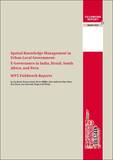|
The past few decades have witnessed a highly uneven process of political and administrative decentralisation across many countries. Both developed and developing nation states have had to come to terms with emerging global governance orthodoxies whilst citizens have mobilised for greater access to processes that govern them. In the global south some political transitions have also opened room for new arrangements between levels of government. The unevenness of these processes has its roots in a range of factors that could include: influential historical domestic governance relationships; the relationships between actors internal to nation states and those external to them, including the influence of global governance orthodoxies; the character of any political transitions and the historic patterns of subnational government arrangements. In this regard, any expectation that one is likely to find substantial congruity across the experiences of different countries (and spaces within those countries) is likely to leave investigators somewhat perplexed at the nuances and peculiarities that abound in the case studies that have formed the basis of this study.
This research process sought to try and understand how selected fast growing cities in the global south fared in the context of fiscal decentralisation and participatory governance (including public participation) as part of an effort to examine the degree to which these elements had contributed to wider urban outcomes, and more particularly for more inclusive urban environments for the urban poor.
|
Recent Chance2Sustain PublicationsMegaprojects and Urban Development in Cities of the South by Loraine Kennedy et al.
Traveling Concepts in Megaproject Building by Loraine Kennedy and Glen Robbins
Sustainable Data Science for Sustainable Cities: Big Data and the Challenge of Urban Development by Linnet Taylor
Participatory Mapping in Informal Settlements: An Instrument for Empowerment, or Exclusion? Reflections from Three Cities in South Africa and India by Catherine Sutherland et al.
Mapping as Tool to Understand Urban Inequalities by Isa Baud and Karin Pfeffer |
|
|
|
|
|

